Emphasis on Regional Cooperation for Peace
In a recent address at the 79th session of the United Nations General Assembly, Dr. Rashad Mohammed Alimi, President of the Presidential Leadership Council of Yemen, emphasized that the path to regional peace begins with robust support for member states of the United Nations and moderate forces in the region, particularly under the leadership of Saudi Arabia. He advocated for a comprehensive deterrence strategy against militias and terrorist organizations.
Urgent Need for Collective Action
President Alimi urged the international community to adopt a collective approach to bolster the Yemeni government’s capacity to protect its territorial waters and ensure national security. He reiterated the government’s commitment to a comprehensive and just peace based on national, regional, and international frameworks. However, he stressed the importance of reinforcing the government’s position to counteract the ongoing escalation by Houthi militias both locally and regionally.
He warned that the continued global leniency towards the Houthis poses a significant threat to international peace and security. “To prevent the expansion and sustainability of this escalation, there is an urgent need for a collective approach to support the Yemeni government,” he stated.
Need for Addressing Key Issues
The president highlighted that without addressing the critical needs of the Yemeni government and implementing relevant international resolutions to ban Iranian arms flows, the Houthis will not engage in any efforts to achieve a comprehensive and just peace. He noted that they would continue their extortion tactics against the regional and international community.
Alimi expressed gratitude for the international community’s unity and support for Yemen but called for this support to translate into actions that match the severity of the threats facing the country and the region.
Historical Lessons and Ongoing Violations
The president reminded the assembly that history teaches us that leniency towards enemies of peace often leads to the most devastating and costly wars. Despite the ceasefire agreed upon by the government in April 2022, Houthi militias continued their military violations and gross human rights abuses.
He cited incidents such as the Houthi attacks on oil export ports in Hadramout and Shabwa in October 2022, which deprived the Yemeni people of essential revenues and exacerbated the humanitarian crisis, leading to unprecedented declines in the national currency.
Calls for Serious Negotiations
Alimi mentioned the Yemeni government’s recent decision to freeze its plans to relocate bank headquarters from Houthi-controlled Sanaa to the temporary capital, Aden, in response to UN and international calls for de-escalation. He stressed that this was contingent upon the Houthis participating in serious negotiations to address the economic crises, particularly the currency crisis, as part of a peace effort facilitated by Saudi Arabia and Oman.
However, he noted that the Houthis responded by hijacking three Yemenia Airlines planes and attacking the Safer oil facility in Marib with drones, alongside issuing discriminatory laws to consolidate public service positions within their loyal militia ranks, indicating a trend towards further oppressive measures against civil liberties.
International Responsibility and Human Rights Violations
President Alimi emphasized that the ongoing reckless escalation by the Houthis necessitates decisive international policies to push the militias toward peace efforts in accordance with international resolutions, particularly UN Security Council Resolution 2216.
He also addressed the severe human rights violations committed by the Houthis, including the recent detention of dozens of UN staff members, adding to the thousands of innocent civilians, including women, children, and the elderly, who have been imprisoned for years.
Threats to Global Trade and Security
The president highlighted the implications of the Houthis’ continued terrorist attacks on global trade in the Red Sea and surrounding waterways. He stated that the Houthis now pose a growing threat not only to Yemen but also to regional stability and the safe flow of over a trillion dollars in international trade. The group has become the first in history to use ballistic missiles and drones against civilian commercial vessels.
He cited a recent attack on the oil tanker “Sonioun,” which was carrying approximately one million barrels of crude oil, nearly resulting in one of the largest oil spills in history.
Economic Challenges and Humanitarian Crisis
The Yemeni economy has faced complex challenges for years, further exacerbated by Houthi attacks on oil facilities. The economic war waged by the militias aims to undermine the government’s ability to provide essential services and pay public sector salaries, worsening the humanitarian crisis affecting over 14 million Yemenis.
The president called on the international community to recognize the catastrophic effects of these terrorist acts and to secure vital infrastructure and protect maritime shipping in Yemeni ports.
A Call for Urgent International Support
Alimi renewed Yemen’s call for urgent and comprehensive international support to address the catastrophic humanitarian situation and lay the groundwork for long-term economic recovery. This includes immediate humanitarian assistance to alleviate suffering, stronger accountability mechanisms, and increased investments in infrastructure, healthcare, education, and sustainable development.
He stressed that Yemen’s recovery is not merely a national issue but a regional and global necessity, as its stability is crucial for maintaining peace, regional security, and trade routes in the Red Sea and beyond.
Conclusion: A Unified Stand for Peace
In conclusion, President Alimi reiterated the importance of supporting moderate forces in the region, led by Saudi Arabia, which has borne the responsibility of defending international decisions and providing assistance to millions affected by wars and armed conflicts.
He also called for an immediate end to the brutal Israeli war against the Palestinian people, emphasizing that this is key to achieving the desired peace and addressing the Iranian influence that exacerbates regional tensions.
In a powerful closing, he reminded the assembly that the path to peace requires a unified international stance against aggression and a commitment to uphold human rights and dignity for all.
To follow the news in Arabic
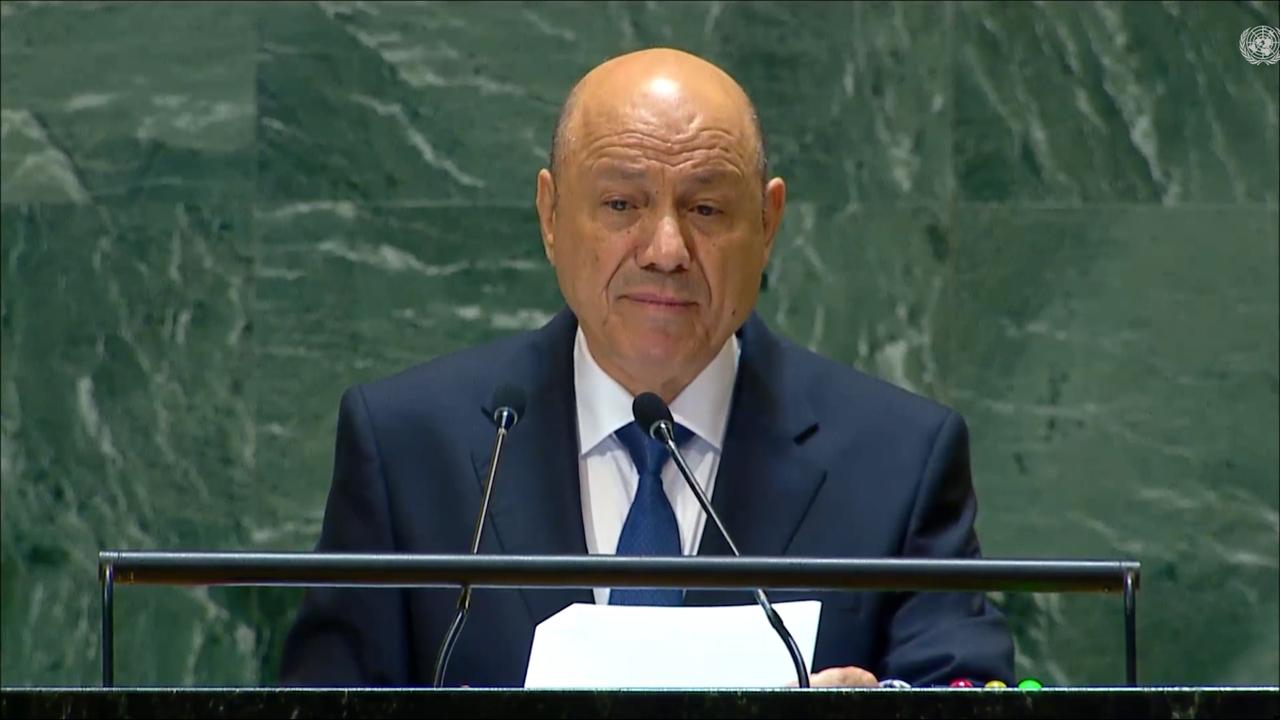
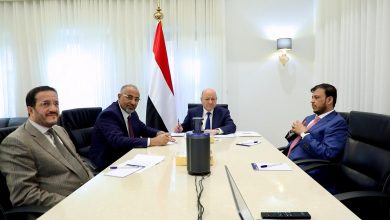 The Presidential Leadership Council discusses national and regional developments in a recent meeting.
The Presidential Leadership Council discusses national and regional developments in a recent meeting.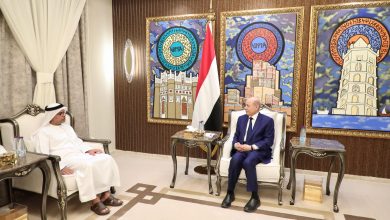 The Chairman of the Presidential Leadership Council receives the Ambassador of the United Arab Emirates.
The Chairman of the Presidential Leadership Council receives the Ambassador of the United Arab Emirates.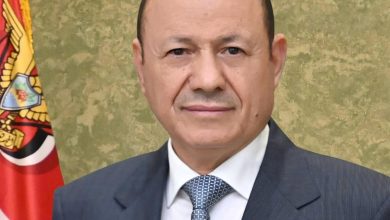 The Chairman of the Leadership Council praises the new British support for the Yemeni Coast Guard forces.
The Chairman of the Leadership Council praises the new British support for the Yemeni Coast Guard forces.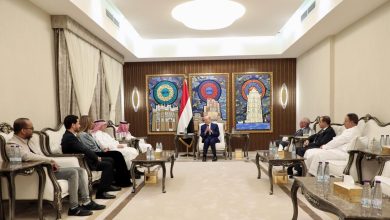 The Chairman of the Leadership Council receives the leadership of the Yemeni Orchestra.
The Chairman of the Leadership Council receives the leadership of the Yemeni Orchestra.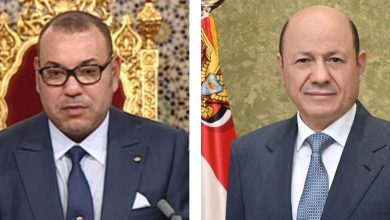 The Chairman of the Presidential Leadership Council extends congratulations on Morocco’s Independence Day.
The Chairman of the Presidential Leadership Council extends congratulations on Morocco’s Independence Day.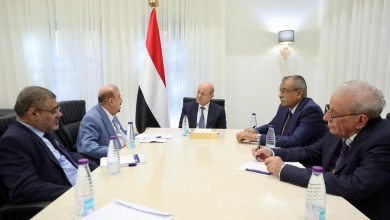 The President of the Presidential Leadership Council meets with the Chairman and members of the Parliamentary Leadership Council.
The President of the Presidential Leadership Council meets with the Chairman and members of the Parliamentary Leadership Council.